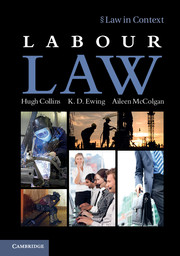Book contents
- Frontmatter
- Contents
- Preface
- Acknowledgments
- Table of cases
- Table of statutes
- Table of statutory instruments
- Table of European Union instruments
- Table of ILO instruments
- Table of other international instruments
- Abbreviations
- Part I Introduction
- Part II The contract of employment
- Part III Statutory regulation of the employment relationship
- Part IV Collective labour rights
- 12 Freedom of association and the right to organise
- 13 Freedom of association and trade union autonomy
- 14 The right to bargain collectively
- 15 The right to be informed and consulted
- 16 Collective action and the right to strike
- 17 Liability for collective action
- Part V Termination of employment
- Index
- References
16 - Collective action and the right to strike
from Part IV - Collective labour rights
- Frontmatter
- Contents
- Preface
- Acknowledgments
- Table of cases
- Table of statutes
- Table of statutory instruments
- Table of European Union instruments
- Table of ILO instruments
- Table of other international instruments
- Abbreviations
- Part I Introduction
- Part II The contract of employment
- Part III Statutory regulation of the employment relationship
- Part IV Collective labour rights
- 12 Freedom of association and the right to organise
- 13 Freedom of association and trade union autonomy
- 14 The right to bargain collectively
- 15 The right to be informed and consulted
- 16 Collective action and the right to strike
- 17 Liability for collective action
- Part V Termination of employment
- Index
- References
Summary
Introduction
In this chapter, we consider the legal responses to workplace disputes that lead to strikes or other forms of industrial action. A strike is a withdrawal of labour by a group of workers who are in dispute with their own employer, or sometimes with another employer. The dispute may lead to forms of action other than (or as well as) a strike, such as an overtime ban, working to rule, or refusing to carry out certain tasks – all designed to put pressure on the employer. There are many reasons why workers may feel compelled to act in these ways, sometimes seeking to improve their terms and conditions of employment, with negotiations between the employer and their trade union having failed. At other times, the employer may be seeking to change existing terms and conditions of employment, with the workers fighting to hold onto what they have. In an era of economic austerity and public sector cuts, defensive action of this latter kind is much more common than in the immediate past. But whatever the reason for taking industrial action, the right to strike is often justified as being ‘an essential element in the principle of collective bargaining’, with the importance of the right to strike in the context of collective bargaining being recognised by the European Social Charter. Being the first international treaty expressly to recognise the right to strike, the Social Charter does so ‘with a view to ensuring the effective exercise of the right to bargain collectively’. If workers were unable to strike, they would have no means of pressing their demands or of resisting the pressure of the employer.
- Type
- Chapter
- Information
- Labour Law , pp. 656 - 705Publisher: Cambridge University PressPrint publication year: 2012



